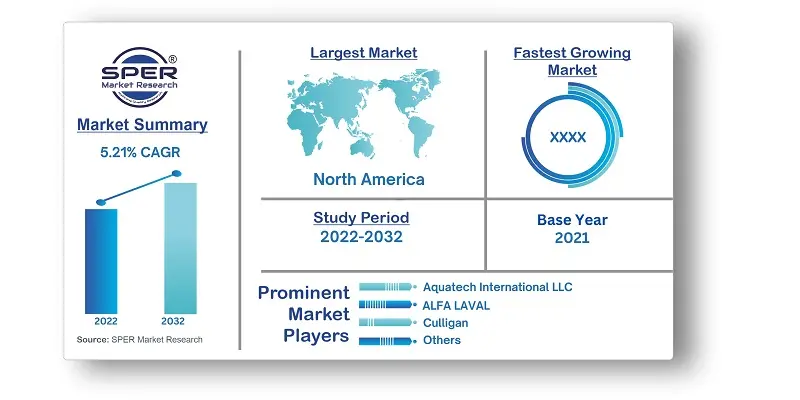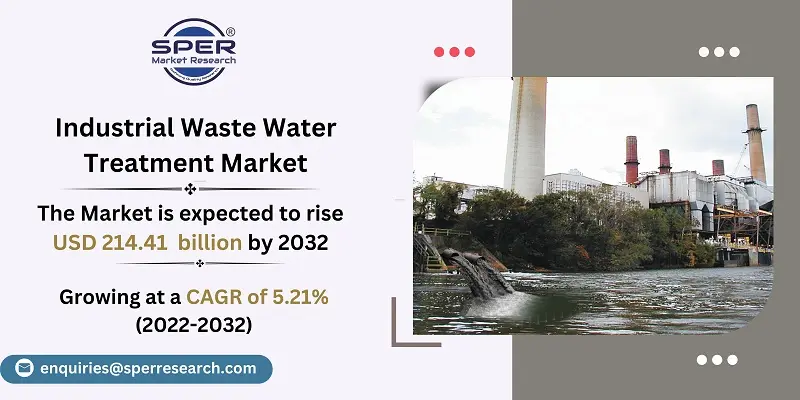
Industrial Waste Water Treatment Market Share, Growth, Opportunities and Forecast 2032
Industrial Waste Water Treatment Market Size- By Technology, By Process, By End Use, By Application- Regional Outlook, Competitive Strategies and Segment Forecasts to 2032
| Published: Dec-2022 | Report ID: POAE2205 | Pages: 1 - 229 | Formats*: |
| Category : Power & Energy | |||
- July 2020: GEA Group Aktiengesellschaft supplied a ZLD plant to Abengoa, a Mexican firm. The ZLD plant converts salt-laden wastewater into pure water for internal recycling and dry solids for disposal. The company provided thermal and non-thermal technology for ZLD applications, including centrifugal separators, membrane concentrators, evaporators, crystallizers, and dryers.
- May 2019: Egypt awarded its largest wastewater treatment facility contract to a joint venture (JV) formed by Orascom Construction and Arab Contractors. The JV is in charge of engineering, procurement, and building of the Bahr Albaqar wastewater treatment plant.


| Report Metric | Details |
| Market size available for years | 2019-2032 |
| Base year considered | 2021 |
| Forecast period | 2022-2032 |
| Segments covered | By Type, By End-Use |
| Regions covered | North America, Asia-Pacific, Latin America, Middle East & Africa and Europe |
| Companies Covered | Aquatech International LLC, ALFA LAVAL, Creative Water Solutions, Culligan, GEA Group Aktiengesellschaft, Minerals Technologies Inc, M W Watermark, MIOX and PURONICS. |
- Environmental agencies
- Pharmaceuticals
- Oil and Gas
- Municipalities
| By Type: |
|
| By End-Use Industry: |
|
| By Region: |
|
- Global Industrial Waste Water Treatment Market Size (FY’2022-FY’2032)
- Overview of Global Industrial Waste Water Treatment Market
- Segmentation of Global Industrial Waste Water Treatment Market By Type (Biocides &Disinfectants, Corrosion Inhibitors, Coagulants, Chelating Agents, Disinfectants, Flocculants, Ph Stabilizers.)
- Segmentation of Global Industrial Waste Water Treatment Market By End-Use (Chemical, Minning, Power Generations, Oil and Gas.)
- Statistical Snap of Global Industrial Waste Water Treatment Market
- Expansion Analysis of Global Industrial Waste Water Treatment Market
- Problems and Obstacles in Global Industrial Waste Water Treatment Market
- Competitive Landscape in the Global Industrial Waste Water Treatment Market
- Impact of COVID-19 and Demonetization on Global Industrial Waste Water Treatment Market
- Details on Current Investment in Global Industrial Waste Water Treatment Market
- Competitive Analysis of Global Industrial Waste Water Treatment Market
- Prominent Players in the Global Industrial Waste Water Treatment Market
- SWOT Analysis of Global Industrial Waste Water Treatment Market
- Global Industrial Waste Water Treatment Market Future Outlook and Projections (FY’2022-FY’2032)
- Recommendations from Analyst
1.1. Scope of the report1.2. Market segment analysis
2.1. Research data source2.1.1. Secondary Data2.1.2. Primary Data2.1.3. SPER’s internal database2.1.4. Premium insight from KOL’s2.2. Market size estimation2.2.1. Top-down and Bottom-up approach2.3. Data triangulation
4.1. Driver, Restraint, Opportunity and Challenges analysis4.1.1. Drivers4.1.2. Restraints4.1.3. Opportunities4.1.4. Challenges4.2. COVID-19 Impacts of the Global Industrial Waste Water Treatment Market.
5.1. SWOT Analysis5.1.1. Strengths5.1.2. Weaknesses5.1.3. Opportunities5.1.4. Threats5.2. PESTEL Analysis5.2.1. Political Landscape5.2.2. Economic Landscape5.2.3. Social Landscape5.2.4. Technological Landscape5.2.5. Environmental Landscape5.2.6. Legal Landscape5.3. PORTER’s Five Forces5.3.1. Bargaining power of suppliers5.3.2. Bargaining power of buyers5.3.3. Threat of Substitute5.3.4. Threat of new entrant5.3.5. Competitive rivalry5.4. Heat Map Analysis
6.1. Global Industrial Waste Water Treatment Market Manufacturing Base Distribution, Sales Area, Product Type6.2. Mergers & Acquisitions, Partnerships, Product Launch, and Collaboration in Global Industrial Waste Water Treatment Market
7.1. Global Industrial Waste Water Treatment Market Size, Share and Forecast, By Type, 2019-20257.2. Global Industrial Waste Water Treatment Market Size, Share and Forecast, By Type, 2026-20327.3. Biocides& Disinfectants7.4. Corrosion Inhibitors7.5. Coagulants7.6. Chelating Agents7.7. Disinfectants7.8. Flocculants7.9. Ph Stabilizers
8.1. Global Industrial Waste Water Treatment Market Size, Share and Forecast, By End-Use, 2019-20258.2. Global Industrial Waste Water Treatment Market Size, Share and Forecast, By End-Use, 2026-20328.3. Chemical8.4. Mining8.5. Power Generation8.6. Oil and Gas
9.1. Global Industrial Waste Water Treatment Market Size and Market Share
10.1. Global Industrial Waste Water Treatment Market Size and Market Share By Region (2019-2025)10.2. Global Industrial Waste Water Treatment Market Size and Market Share By Region (2026-2032)10.3. Asia-Pacific10.3.1. Australia10.3.2. China10.3.3. India10.3.4. Japan10.3.5. South Korea10.3.6. Rest of Asia-Pacific10.4. Europe10.4.1. France10.4.2. Germany10.4.3. Italy10.4.4. Spain10.4.5. United Kingdom10.4.6. Rest of Europe10.5. Middle East and Africa10.5.1. Kingdom of Saudi Arabia10.5.2. United Arab Emirates10.5.3. Qatar10.5.4. South Africa10.5.5. Egypt10.5.6. Morocco10.5.7. Nigeria10.5.8. Rest of Middle-East and Africa10.6. North America10.6.1. Canada10.6.2. Mexico10.6.3. United States10.7. Latin America10.7.1. Argentina10.7.2. Brazil10.7.3. Rest of Latin America
11.1. Aquatech International LLC11.1.1. Company details11.1.2. Financial outlook11.1.3. Product summary11.1.4. Recent developments11.2. ALFA LAVAL11.2.1. Company details11.2.2. Financial outlook11.2.3. Product summary11.2.4. Recent developments11.3. Creative Water Solutions11.3.1. Company details11.3.2. Financial outlook11.3.3. Product summary11.3.4. Recent developments11.4. Culligan11.4.1. Company details11.4.2. Financial outlook11.4.3. Product summary11.4.4. Recent developments11.5. GEA Group Aktiengesellschaft11.5.1. Company details11.5.2. Financial outlook11.5.3. Product summary11.5.4. Recent developments11.6. Minerals Technologies Inc11.6.1. Company details11.6.2. Financial outlook11.6.3. Product summary11.6.4. Recent developments11.7. M W Watermark11.7.1. Company details11.7.2. Financial outlook11.7.3. Product summary11.7.4. Recent developments11.8. MIOX11.8.1. Company details11.8.2. Financial outlook11.8.3. Product summary11.8.4. Recent developments11.9. PURONICS11.9.1. Company details11.9.2. Financial outlook11.9.3. Product summary11.9.4. Recent developments
SPER Market Research’s methodology uses great emphasis on primary research to ensure that the market intelligence insights are up to date, reliable and accurate. Primary interviews are done with players involved in each phase of a supply chain to analyze the market forecasting. The secondary research method is used to help you fully understand how the future markets and the spending patterns look likes.
The report is based on in-depth qualitative and quantitative analysis of the Product Market. The quantitative analysis involves the application of various projection and sampling techniques. The qualitative analysis involves primary interviews, surveys, and vendor briefings. The data gathered as a result of these processes are validated through experts opinion. Our research methodology entails an ideal mixture of primary and secondary initiatives.



Frequently Asked Questions About This Report
PLACE AN ORDER
Year End Discount
Sample Report
Pre-Purchase Inquiry
NEED CUSTOMIZATION?
Request CustomizationCALL OR EMAIL US
100% Secure Payment






Related Reports
Our Global Clients
Our data-driven insights have influenced the strategy of 200+ reputed companies across the globe.




















